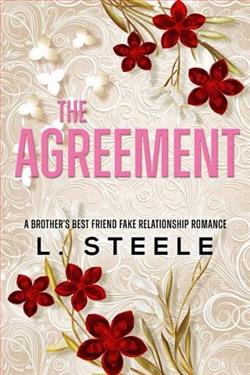Page 19 of The Thinnest Air
“Not sure.”
“You always got the eggs Benedict,” I say. “And I always got the French toast. I’m thinking we should probably play it safe and not buck tradition.”
I’m teasing, trying my hardest to create a light and casual ambiance between us, but she doesn’t respond.
“Why are you so quiet?” I ask. “What are you thinking about?”
Greer exhales, shaking her head as she stares out her window. “It’s nothing.”
“It’s not nothing. You were all about this until you saw my shoes. Is it the shoes?” My voice rises, and the cabdriver checks the rearview mirror. “Greer.”
“It’s more than the shoes.”
“Is it the cab?” I ask.
The driver looks up again.
“I just feel like every time I see you, you’re a little less you and a little more someone I hardly recognize,” she blurts, her words coming out terse and fast. “Just trying to wrap my head around it is all.”
I laugh at the absurdity of my sister’s statement. “I’m still me. Always will be.”
The cab pulls to a rough stop, and the driver turns off the meter. I swipe Andrew’s American Express card to pay for the ride, and Greer climbs out. A moment later, I join her on the curb outside the restaurant.
“It’s just that you’re doing what Mom used to do,” she says, arms crossed.
My eyes widen. “Please tell me you didn’t just compare me to her.”
“You know I have a point.”
Our gazes lock, as if we’ve reached an impasse, and I don’t know what to say to my sister. Our mother had a penchant for morphing into all these different people, sometimes overnight, sometimes over the span of a few weeks or months. She didn’t have any kind of personality disorder; she’d just treat her life like an old pair of shoes, changing them out with each turn of the season or each new boyfriend who waltzed into her life.
One year, she went from a free-spirited, gypsy-blouse-and-braid-wearing hippie to an uptight, organic-food-obsessed PTA mom in under eight hours. Most of the time we’d see the changes coming and we could anticipate them, but not that time. I’ll never forget her shipping me off to school one morning in her hemp robe with tangled braids spilling down her shoulders, and when she greeted me at the door that afternoon, she was in a pencil skirt with a sheared, sleek bob, getting ready to unload half a dozen brown paper bags from Whole Foods.
Greer says Mom was working as a housekeeper at a private high-rise filled with well-to-do tenants when she met my father. She’d overheard a couple of women talking at the park about how their friend’s cousin’s sister went from housekeeper to wife of a multimillionaire business mogul. My mother had never met any millionaires, at least none that she knew personally. Cleaning toilets was her way into their world. She was a mouse, and housekeeping was the crack in the wall through which she slipped.
My father’s name was Yossi Natan, and he was a real estate developer out of Israel, only in the city for two years. Greer doesn’t know how the affair started—just that he was married, with several children back home in Kfar Saba, and my conception was a huge complication. But before he left, he established a trust fund in my name to be accessed on my twenty-sixth birthday and ensured my mother received a modest monthly stipend in exchange for her silence.
I’ve only ever seen his photo online, and I can never read the captions because they’re in Hebrew.
There isn’t much I know about Yossi besides the fact that we share the same sandy-colored hair and caramel complexions and our features are an exotic blend of European and Middle Eastern. I have his straight nose, full mouth, and hooded eyes, but other than that, I have nothing else ... not even his last name.
Or any hope of meeting him in this lifetime, which is still a bitter pill to swallow no matter how many years go by. It’s like I’m missing this huge part of me, and there’s absolutely no chance I’ll ever get it back.
Greer says when I was five, I had an “imaginary dad,” which I suppose was like an imaginary friend only more of a father figure? She says she’d hear me through the walls at night, talking to him. And after school, I’d claim he was walking beside us as we navigated the busy Queens sidewalks that led to our apartment.
I have no recollection of any of that, but it makes my heart hurt when I think of five-year-old me, so desperate to know the love of a father.
“I promise, Greer, it’s not like that,” I say. “I’m not her. Far from it. You have nothing to worry about. I’m me. I just have a better wardrobe these days.”
I try to get a smile from her, but I still sense her concern.
“There’s nothing wrong with having nice shoes,” I say. “They’re just shoes for fuck’s sake!”
Our eyes lock, and she chews her lower lip. She’s always been anxious about things beyond her control, but I don’t blame her. She had it rough. Not only did she have to raise me, but she was stuck raising my mother most of the time as well. Greer was always the one making sure our rent was paid on time. Greer was the one who took over grocery shopping when my mother left us with empty cupboards far too many times. Greer was the one who signed me up for school each year and made sure my birthdays were never forgotten.
She always had to stay one step ahead of everything, making sure nothing bad ever happened to either of us. I can’t imagine it was easy, always anticipating the worst, living your life waiting for the other shoe to drop.
In fifth grade, my teacher sent me to the school nurse’s office because I wouldn’t stop scratching my head. The nurse who examined me gasped in horror, freaking out and darting around the room and scrambling for her phone. I overheard her telling the school receptionist that I had the worst case of head lice she’d seen in twenty-eight years on the job. I also heard her say she had half a mind to call Child and Family Services because I was clearly neglected.















